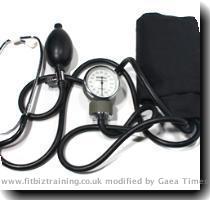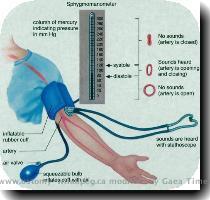Studies: People with variable blood pressure could be at risk of a stroke
By Maria Cheng, APFriday, March 12, 2010
People with variable blood pressure at stroke risk
LONDON — People with occasional spikes in their blood pressure could be at higher risk of having a stroke than those with regularly high blood pressure, new studies said Friday.
In four articles published in the medical journals Lancet and Lancet Neurology, European researchers suggest current guidelines for treating people with high blood pressure need to be revised.
In one of the studies, Peter Rothwell of the Stroke Prevention Research Unit at John Radcliffe Hospital in Oxford, Britain, tracked about 8,000 patients who had had a heart attack. They found patients who had consistently variable blood pressure rates were at least six times more likely to have a stroke than those with regularly high blood pressure.
“We tend to believe average underlying blood pressure rates and ignore occasional high rates as blips,” Rothwell said. “But it turns out they are very informative and that these people, who are mostly not treated for hypertension, could be at high risk of having a stroke.”
In two other studies, Rothwell and colleagues examined the effects of different blood pressure drugs. They found the drugs that reduced occasional spikes in blood pressure rates the best were the most effective at preventing strokes.
No funding was provided for any of the studies.
Rothwell estimated the findings could double the number of people being treated for high blood pressure, which accounts for about 50 percent of a person’s stroke risk. High blood pressure affects more than half of all adults.
Experts have previously studied whether people with fluctuating blood pressure rates are at greater risk of having a stroke, but the Lancet studies are the first to track the risk over several years.
The American Heart Association recommends everyone with high blood pressure check their rates at home regularly, since having readings taken a few times a year in the doctor’s office may not be accurate enough.
Other doctors said while Rothwell and colleagues’ findings are intriguing, more evidence is needed before changing treatment recommendations.
“We can’t change the guidelines every time something new comes up,” said Lars Hjalmar Lindholm of Umea University Hospital in Sweden, who was not linked to the studies. “We should be a bit cautious before we change how patients are treated.”
Still, Lindholm called the Lancet studies “a fantastic contribution” to our understanding of blood pressure.
Rothwell said people with variable blood pressure rates shouldn’t rush to change their treatment, but should talk to their doctors. “The damaging effect of variable blood pressure takes months and years to develop,” he said.
He said patients with consistently high blood pressure should continue to be monitored — and that some of them with occasionally high rates could benefit from changing their medications.
“I wouldn’t want people to think if their blood pressure is stable and high, that isn’t a bad thing. They definitely need to be treated,” he said. “It’s just that the patients we’ve currently been reassuring, whose blood pressure isn’t high all the time, also need to be treated.”
On the Net:
www.lancet.com
Tags: cardiovascular disease, Diseases And Conditions, Europe, Heart Health, london, Medical Research, Stroke, United Kingdom, Western Europe



